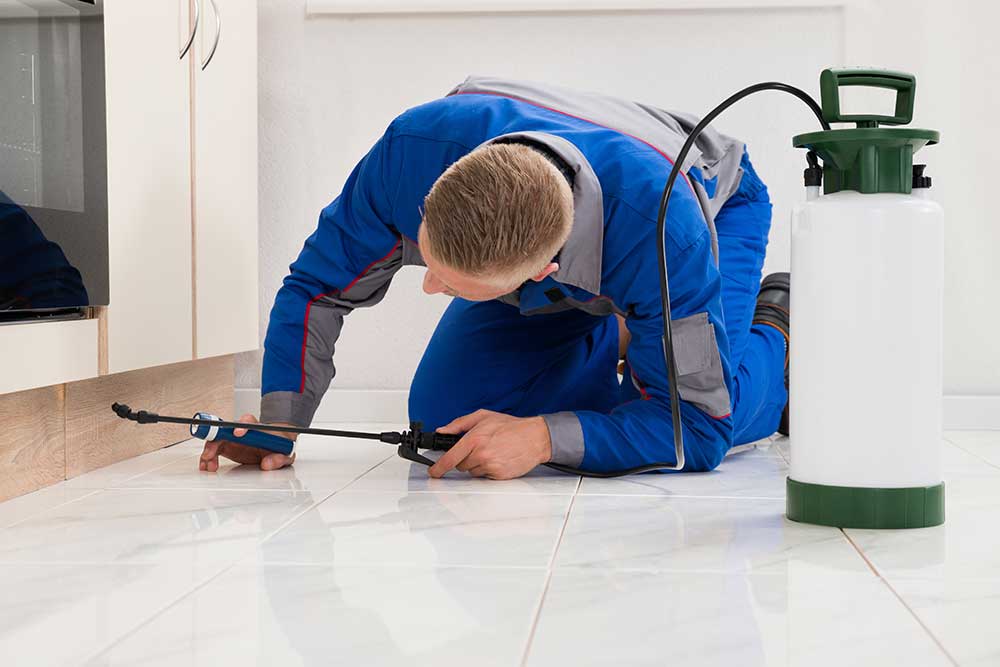Disclaimer: The information on our website is provided for general information purposes only. We make no representations or warranties of any kind, express or implied, about the completeness, accuracy, reliability, suitability or availability with respect to the website or the information contained on our website for any purpose. Any reliance on such information is therefore strictly at your own risk and we are not liable for any damages or losses arising out of or resulting from your reliance on any information contained on our website.
A pest control worker is sometimes referred to as an exterminator. Exterminators go to client homes and businesses to inspect for insects or rodents. Pest control workers then use the appropriate method to remove or terminate the pest, whether that be a pesticide, trap, or another method. These professionals may also specialize in a particular area of pest control and their titles and positions may vary by state.
Watch a video to learn more about a typical day in this career field:
How to Become a Pest Control Worker / Exterminator

Every home and building, at some point, will need a hero to rescue them from pesky invaders like cockroaches, mice, and termites. That hero? A pest control worker! If you’re someone who loves problem-solving, working with your hands, and making spaces safe and pest-free, this might be the job for you. Let’s dive into the steps to become a successful pest control worker.
To start your career in this field, you must have a high school diploma or the equivalent and state laws also require these workers to be licensed which usually involves training and passing an exam. Some states require passing a background check as well. Many workers begin their careers as assistants and gain on-the-job training. Next, formal instruction is often delivered by an experienced professional working in the field. Their training can also include specialties such as termite control, rodent control, and fumigation.
Also, all people that handle pesticides in this industry are required to complete training in pesticide use and safety as there are health risks involved. This training normally takes less than 3 months to complete.
Build Essential Skills
Apart from formal training and education, certain skills can make you an outstanding pest control worker:
- Attention to Detail: You’ll need to spot signs of pests, which can often be tiny or hidden.
- Stamina: The job can be physically demanding, requiring you to be on your feet, crawl into tight spaces, or carry equipment.
- Problem-solving: Every pest issue is a puzzle waiting to be solved.
- Communication: You’ll need to explain to clients the issues and how you’re tackling them.
- Safety: Dealing with pests often means using chemicals that can be harmful if not handled correctly. Always prioritize safety. Wear protective gear, like gloves or masks, and always follow guidelines on safe chemical use.
- Stay Updated: Pest control is an evolving field. New methods, tools, and best practices emerge regularly. Joining a professional organization, such as the National Pest Management Association, can help you stay updated with the latest in the industry.
Becoming a pest control worker is about more than just handling bugs and rodents. It’s about ensuring homes and businesses are safe, clean, and healthy. With the right training, skills, and dedication, you can build a rewarding career in this field. Let’s move on and look at the job description.
Job Description of Pest Control Worker
Pest control workers travel to sites that have possible insect or recent infestation. They perform inspections to determine the problem and type of treatment needed to eliminate the pests. They also measure the dimensions of the area that is infested and give a cost estimate of their services. At times the structural integrity of a building may be at risk, therefore they need to design and carry out integrated pest control plans. They create barriers to prevent pests from entering a building and apply pesticides or traps.
Pest control workers may need to remove or kill a variety of bugs or animals to include bedbugs, roaches, termites, ants, rats, bats, or other wildlife. There are two types of workers and their titles and positions vary according to each state. One career is a pest control technician, which can only use a limited range of pesticides, identify pest problems, design control strategies, and work directly with the client to come up with solutions. The second worker is an applicator, who uses a wide range of pesticides and might specialize in a particular area of pest control. An example is a termites control technician; they use chemicals and modify structures to eliminate termites and prevent future infestations and possibly repair structural damage done by termites. Another applicator is a fumigator; this person uses gases to treat specific kinds of pests or large-scale infestations.
Employment is generally full time and often work overtime. They are required to work indoors and outdoors to the nature of their work. They work weekends and evenings as well to meet their client’s demands and schedules. As mentioned above they are exposed to chemicals, therefore often wear protective gear such as respirators, gloves, and goggles while performing their job. In addition they work in small spaces and must be able to bend, crawl, and kneel regularly. They often work in tight spaces and come in contact with rodents or insects.
Pest Control Worker Career Video Transcript
When people in homes and offices hear a dreaded scratching in the walls or see something small and brown skitter across the floor, they are relieved to know a pest control worker is just a phone call away. Pest control workers remove unwanted creatures, such as roaches, rats, ants, bedbugs, and termites from homes, buildings, and surrounding areas. They typically inspect buildings for signs of pests, determine the treatment needed, and estimate the cost of their services for customers.
Their methods include using traps, pesticides and power spraying-equipped trucks to remove or kill pests. There are 2 types of pest control workers: Pest control technicians identify pest problems, conduct inspections, and design strategies. They work directly with customers and use a limited range of pesticides. Applicators use a wider range of pesticides and handle more serious pests such as termites, as well as fumigating houses to treat large-scale infestations. Most pest control workers work full time, often including evenings and weekends. Overtime is common. A high school diploma or equivalent is usually required, and employers provide formal instruction and on-the-job training.
Article Citations
Bureau of Labor Statistics, U.S. Department of Labor, Occupational Outlook Handbook, Pest Control Workers.
National Center for O*NET Development. 37-2021.00. O*NET OnLine.
The career video is in the public domain from the U. S. Department of Labor, Employment and Training Administration.

